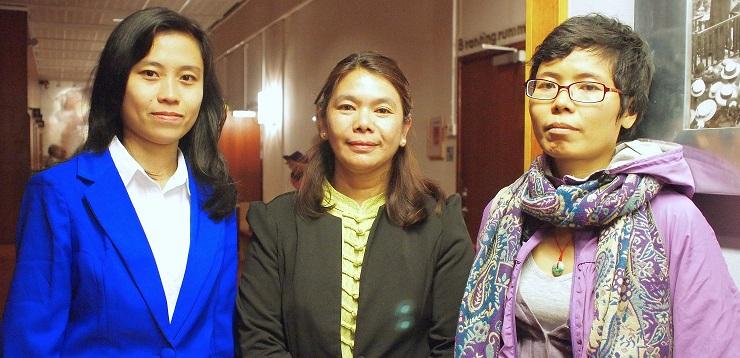ASIACALLING
Rapists get paid in Burma
"The Burmese army often uses sexual violence against women in minority ethnic communities to gain control of local natural resources – and to extort money from shamed families."

There are many positive changes taking place in Burma since the democratically elected government came in power.
Led by Aung San Suu Kyi, her NLD landslide victory ended 50 years of military rule.
But today, as before, the Burmese army often uses sexual violence against women in minority ethnic communities to gain control of local natural resources – and to extort money from shamed families.
Ric Wasserman reports from a seminar in Stockholm Sweden on sexual violence in Burma led by three outspoken women.
The 60 participants at the seminar on women’s rights in Burma were mainly political refugees – and mostly women.
The looks on their faces and nods seemed to be in understanding with the first speaker, Wei Wei Lwin. We deserve our share of this country’s wealth, she says.
“My father passed away when I was 4 years old due to TB because we could not afford his healthcare. So it means we needed to get our natural resources equality. It can be used for our health, education and social welfare. Otherwise it will not lead to peace,” Wei Wei Lwin told the gathering.
Hence, the ongoing military battles in many of Burma’s ethnic communities.
In the Shan, Karen, Chin, and Kachin states, wars are being fought for a share of natural resources.
These are brutal and protracted wars. When the Burmese army comes into the villages sexual abuse is just another of the tools of denigration of the local population.
But the culture of impunity and intimidation holds women back from reporting rape, or seeking redress.
In fact, rapists are often paid for committing atrocities, says Thadar Oo, from the NGO New Generation in Shan state.
“There are some cases that after rape, the rapist and victim marry, encouraged by the shamed family and village chief. Five days later they agree to a divorce – if the rapist gets paid,” says Thadar Oo.
First pain, then shame and humiliation, then financial burden.
And the usual perpetrators of rape are military – exempt from civil laws.
“This is done by the soldiers, so when they commit a crime they are regulated by army law which is not fair at all. For me, for us, we want to say to every citizen has to be under the same law. Civil law,” stated Wei Wei Lwin.
I look back at the crowd of Burmese women behind me. One of them is sobbing quietly.
We Wei Lwin has been fighting for women’s rights for over 10 years. She’s angry that women are merely meant fill a quota and not really encouraged to be included in the lawmaking process alongside men.
“When we talk about a quota it’s 30 %. I don’t want to just fill the seat. I don’t want to fill a seat. I want to get a genuine participation. Let me get involved in this process,” appealed Lwin.
It’s also about raising the status of women – both in the community and at the government level, says journalist San Yamin Aung.
Women have only 3% of the parliament seats.
“Our country is a very centralised country. If I am a civil servant, especially a woman, doesn’t get a high rank,” Aung said.
The three women are hoping to raise awareness in Europe for the role women should play in the democratic development of Burma.
Anna Ek from the Swedish Peace and Arbitration Society underlines the need for women to be learn from each other.
“By letting activists and women activists come together, discuss and get training and more knowledge. I think that also gives a sense of even more empowerment and energy to go back home and encourage other women and grassroots activists to become more involved in their societies,” Ek said.
- Ric Wasserman
- Burma women
- Burma military
- Burma political representation
Komentar (0)
KBR percaya pembaca situs ini adalah orang-orang yang cerdas dan terpelajar. Karena itu mari kita gunakan kata-kata yang santun di dalam kolom komentar ini. Kalimat yang sopan, menjauhi prasangka SARA (suku, agama, ras dan antargolongan), pasti akan lebih didengar. Yuk, kita praktikkan!